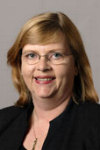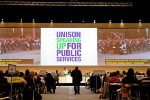 |
 |
|||||||||||||||||||||||||||||||||||||||||||
|
|
Kate Ramsden, Branch Chair told conference that despite all the ConDem rhetoric, it is absolutely clear that our economy depends on a healthy public sector. She said, however, that our branch was concerned that the ConDem Government was winning the propaganda arguments; that the public, including many of our own members had swallowed whole the myth that we all had to "share the pain" in order to deal with the recession. "We have worked hard in our branch, as in many others, to challenge these myths and lies and to give our stewards and activists the tools and the information to take forward the alternatives," said Kate. "This is absolutely vital as already we are seeing the impact of job losses in the public services on local economies." She told conference that we are NOT all in this together. That these cuts will hit the poor and low paid way more that the rich. Just last week the Institute for Fiscal Studies reported that inflation is almost twice as high in low income households as in wealthier ones. "Only the very wealthy and the bankers seem to be getting off scot free," slammed Kate. "And these are the very people that created this crisis in the first place." "It is immoral that bankers are raking in bonuses of £7 billion when our members are being thrown out of work and our public services are being slashed." She called for work through LabourLink to support and promote a credible political opposition to cuts to public services and an amendment from Glasgow City ensured that this should be at both local and national level, regardless of whatever party is in power. Challenging the disgrace of cuts and child povertyDelegates called on the union to work with the "widest alliance", not only to oppose cuts but to plan for improvements to the benefit system and their political implementation. These deep and rapid cuts to benefits were not in any election manifesto. And now, nearly a year on, there are few people left who don't know that these cuts are unfair and will hit the most vulnerable the hardest, agreed Conference. The speed and scale of the cuts are not an economic necessity, but a political choice and one that conference believes needs to be challenged at every level.
Susan Kennedy, Assistant Branch Secretary, speaking to our branch amendment, threw the spotlight on child poverty and the impact for our children of these cuts. She told conference that the UK already has one of the worst rates of child poverty in the industrialised world. "Twenty seven per cent of children in Manchester live in severe poverty", said Susan, adding that across the UK, four million children live in some sort of poverty. Worklessness is a key factor in poverty, especially amongst households where a parent is disabled, and cuts to welfare benefits will only make matters worse. But even more sobering is the fact that 680,000 children in severe poverty across the UK live in households where at least one adult works- a dire reflection on the level of wages for many working people. "Some may well be the children of our low paid members," said Susan. "Conference, this government, like the last, could end child poverty if it had the political will to do it. The money is there - it's just in the wrong hands. "All this amendment asks is that we are explicit about our commitment to campaign to ensure that no child in this country has to grow up in poverty", added Susan. "Conference, the more we see of the policies of this Condem Government, the more we realise that this is becoming a question about what kind of society we want to live in. A society which protects the wealth and opportunity of the privileged few? Or a society that prioritises the health, well-being and life chances of all our citizens and especially our children?" Tools to build an organising union
UNISON agreed a wide ranging strategy to promote the organising agenda within the union as a basis for effective campaigning to face current and future challenges. It will provide a range of practical resources and tools for branches to fight the cuts and recruit new membership. Kate Ramsden said, “We face unprecedented challenges ahead - cuts to our services, our pay and conditions and now our pensions. “Too many people still believe that cuts to public services are unavoidable. We need to get the key message that there is an alternative out there to our members and to the public. We need to mobilise our members to fight these challenges.” Kate highlighted some of the successes in Aberdeenshire branch; a Pathways training event for women stewards and a positive engagement with the media; and at Scottish level, a strong lead and tartanised resources from the Policy & Information team and the Communications and Campaigns Committee. Kate warned, however, “We have a long way to go. Our density could and needs to be much better. And our activists are still a small minority. “So let's make sure that the support is there for us to get our message across." To laughter she added, Let 'Nil Desperandum' be our mantra, which in Scots means, we won't let the tossers grind us down!” Who's who?Every UNISON branch elects a delegation to attend annual conference and to vote on behalf of their local branch members. Scotland has about 200 delegates. This branch has three. Two must be women and one of these must be a low paid woman, to reflect the make-up of the branch. The Branch delegation to this year's Conference in Manchester is:
What's what?
UNISON's annual national conference is the union's ruling body. Every year delegates from all over the country take part in debates to choose our campaigning priorities and policies. Conference is chaired by the UNISON National President, who this year is Angela Lynes, a Scottish NEC member from the Glasgow Branch, or by one of her Vice-Presidents. This year there are over 100 motions on the conference agenda again and a number of proposed amendments to the UNISON rules. Only a proportion of motions will actually be debated at Conference because there is not time to hear them all. Motions are therefore "prioritised". Branch motions and amendments Each branch is also allowed to submit "amendments" to motions, to add to the motion or to change a part we don't agree with. The branch has submitted two amendments this year; the first reflects the Branch policy of combatting child poverty; and the second is in relation to the welfare of asylum seeker children, which is also branch policy. They all add to the motions rather than changing them in any way. Motions are passed by a straight majority of the conference delegates on a hand vote. If it is close, conference delegates or the chair of conference can call for a card vote. The number of card votes per delegation is based on the number of members in the branch. Amendments to rule need to be approved by a two-thirds majority of the voting delegates. Card votes can also be called for (and often are) in rule changes. Thursday afternoon is traditionally the time that the rule changes are debated. Many delegates find this session really boring, but in recent years it has produced some of the best debates, and often the funniest speeches. As delegates we will vote on the motions and the rule changes in line with branch policy, where we have that in place and we can speak for or against any of the motions, amendments and rule changes, again in line with Branch policy, if we have a position. |
|
||||||||||||||||||||||||||||||||||||||||||
 Annual
Delegate Conference
Annual
Delegate Conference 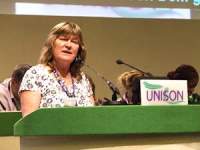
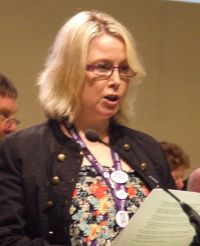
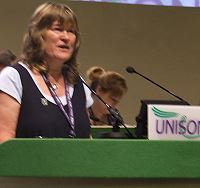






 Kate,
as a member of UNISON Scotland's Communications and Campaigns
Committee, is also one of the three person team, that makes up
the UNISON Scotland Conference Briefing Team.The team issues briefings
throughout conference which keep Scottish delegates up to date
with UNISON Scotland's position on the debates and reports on
the week's business. The briefings have also been known to be
quite amusing and are sought after by many outwith the Scottish
delegations.
Kate,
as a member of UNISON Scotland's Communications and Campaigns
Committee, is also one of the three person team, that makes up
the UNISON Scotland Conference Briefing Team.The team issues briefings
throughout conference which keep Scottish delegates up to date
with UNISON Scotland's position on the debates and reports on
the week's business. The briefings have also been known to be
quite amusing and are sought after by many outwith the Scottish
delegations.